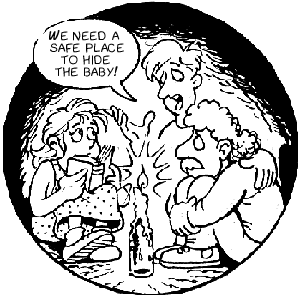What we want to do is to get the true meaning of the passages referred to above (which quote both Christ and Paul as saying essentially the same thing), because we feel that the truth must be somewhere between the Protestant and Catholic extremes.
Both Paul and Christ make the unusual comment that it is only advice that they are giving in this situation, and not a hard law. Nowhere else do we find them speaking in this way. From this, we must conclude first, that it is not a sin to marry (or to have children, which we will be discussing a bit more later). But it is advisable not to. And just because some of us marry (or have children) should not lead us to over-justify our position, by teaching others that marriage is God's ideal.
Next we need to ask ourselves "Why did they offer this advice?" Paul said that it is better to remain single so that we can be free to work for God (1 Corinthians 7:32-34).
(Note: We are writing this series of booklets from our own perspective as a community of fulltime Christian workers who live together seven days a week. Some of what we say may not be as relevant to the average family as it is to us; but a lot will be.)
We are like an army, fighting a war in an alien world. There is often the need to make radical changes very quickly. In the Australian Air Force, single recruits can be transferred any time the commanding officers choose to transfer them. But married couples with children are appointed to a base for a minimum of two years.
Within our own group, couples need to be treated as one. This is frustrating when the wife might be better suited to one location and the husband might be better suited to quite a different location.
Obviously, remaining single makes us much more flexible. But difficulties associated with moving childless couples are nothing compared to the problems we face when moving an entire family. Not only are there extra tickets to be purchased and housing to be located, but after they get there, often one parent or the other is fully occupied just teaching the children, and cannot be counted on for other evangelistic work.
So we have encouraged singles to stay single; but we have added that they might also consider marriage without children as a second option. If they feel that they cannot endure a celibate life, but still wish to be free to move around for God, then birth control may be just the answer.
 Our approach is a far cry from the two Catholic extremes (i.e. no marriage at all, or marriage almost exclusively for the purpose of creating children). But it is more consistent with what both Jesus and Paul actually said. However, neither celibacy nor birth control are ironclad rules. It is not a sin to marry, nor is it a sin to have children. It's just that neither one is advisable, if they can be avoided.
Our approach is a far cry from the two Catholic extremes (i.e. no marriage at all, or marriage almost exclusively for the purpose of creating children). But it is more consistent with what both Jesus and Paul actually said. However, neither celibacy nor birth control are ironclad rules. It is not a sin to marry, nor is it a sin to have children. It's just that neither one is advisable, if they can be avoided.
(Note: We are writing this series of booklets from our own perspective as a community of fulltime Christian workers who live together seven days a week. Some of what we say may not be as relevant to the average family as it is to us; but a lot will be.)
We are like an army, fighting a war in an alien world. There is often the need to make radical changes very quickly. In the Australian Air Force, single recruits can be transferred any time the commanding officers choose to transfer them. But married couples with children are appointed to a base for a minimum of two years.
Within our own group, couples need to be treated as one. This is frustrating when the wife might be better suited to one location and the husband might be better suited to quite a different location.
Obviously, remaining single makes us much more flexible. But difficulties associated with moving childless couples are nothing compared to the problems we face when moving an entire family. Not only are there extra tickets to be purchased and housing to be located, but after they get there, often one parent or the other is fully occupied just teaching the children, and cannot be counted on for other evangelistic work.
So we have encouraged singles to stay single; but we have added that they might also consider marriage without children as a second option. If they feel that they cannot endure a celibate life, but still wish to be free to move around for God, then birth control may be just the answer.
 Our approach is a far cry from the two Catholic extremes (i.e. no marriage at all, or marriage almost exclusively for the purpose of creating children). But it is more consistent with what both Jesus and Paul actually said. However, neither celibacy nor birth control are ironclad rules. It is not a sin to marry, nor is it a sin to have children. It's just that neither one is advisable, if they can be avoided.
Our approach is a far cry from the two Catholic extremes (i.e. no marriage at all, or marriage almost exclusively for the purpose of creating children). But it is more consistent with what both Jesus and Paul actually said. However, neither celibacy nor birth control are ironclad rules. It is not a sin to marry, nor is it a sin to have children. It's just that neither one is advisable, if they can be avoided.Many people find it hard to bring themselves to say this, because they see child-bearing as the ultimate ministry for a woman, and the primary purpose for a marriage. Anything less than that is considered selfish and "unnatural".
Obviously, the motives for practicing birth control and for staying single are not the same for everyone. Staying single so that you can sleep around, or practicing birth control so that you can make more money are not exactly Christian motives. But it doesn't mean that there are no such things as Christian motives for these practices.
 Because our society has come to see children as a nuisance, it is easy to assume that the only Christian alternative is to counteract this by having as many children as we can. How very wrong. Children, when they come, are a blessing from the Lord. But it is up to each one of us to decide whether such a blessing is "expedient" for us personally at this particular time of our life, and at this time in history.
Because our society has come to see children as a nuisance, it is easy to assume that the only Christian alternative is to counteract this by having as many children as we can. How very wrong. Children, when they come, are a blessing from the Lord. But it is up to each one of us to decide whether such a blessing is "expedient" for us personally at this particular time of our life, and at this time in history.We believe that we are living in the period of Earth's history immediately prior to what is known as The Great Tribulation. The Great Tribulation is a time spoken of in the Bible, when there will be worldwide suffering. During this time there will be unprecedented persecution of all who have genuine faith in God. Christ's prophecies solemnly warn that it will be particularly hard for those who are pregnant or who have small children at this time (Luke 21:23), and he says that it will be a "blessing" not to have children (Luke 23:29).
Obviously, if someone was going to try to make us deny our faith, then torturing our children would be one of the easiest ways to do it.
There is no way to prove irrefutably that The Great Tribulation is about to start. (For some good arguments, however, see Baby Book III ,Home Alone). But who can deny the fact that persecutions have taken place elsewhere in the world already, and that the saddest stories have always been the atrocities committed against defenceless children who were caught up in those persecutions?

Our enemies have often succeeded in convincing themselves that they are working for the good of our poor children by persecuting us, or by trying to take our children from us.
At the time when the New Testament was being written, persecution was also a reality. The Apostle Paul said, "I feel this is good advice because of the present distress, that a man not marry and that they that have wives be as though they had none." (1 Corinthians 7:26-29). In other words, he was advising even the married couples to practice the only form of birth control that was available to them at that time, and that was to refrain from having sex.
He was not saying it because sex was evil, but because a pregnancy might slow the couple down, and a child might become a tool in the hands of an anti-Christian world to destroy the faith of the parents.
Of course, there are many who feel that it is their "ministry" to raise children, who will one day be able to do for God what they (the parents) are not personally able to do now, because of family commitments. For those who already have children, this is already their first responsibility. Once you marry and once you have children, you take up responsibilities that you cannot go back on; and we should encourage and help these people to meet those responsibilities to the best of their ability.
But if you haven't yet made such decisions, you might consider discussing it with others. Although some young people would be willing to discuss marriage plans with their parents, most couples today regard family planning as being far too private to discuss with anyone. They do not feel it is anyone's business but their own. We would like to challenge that approach.
Because we are members of a Christian community, such decisions by our members have significant impact on the rest of the community. The rest of us are expected to help out with cooking, cleaning, clothes-washing, and baby-sitting. We also must do without the services of the parents on some group activities when they are needed to care for the kids. So in the broader picture, the children become, at least partially, the responsibility of the entire community. Although biological parents have the final say, it isn't reasonable that the rest of the community be totally "dictated" to by them.

Our enemies have often succeeded in convincing themselves that they are working for the good of our poor children by persecuting us, or by trying to take our children from us.
At the time when the New Testament was being written, persecution was also a reality. The Apostle Paul said, "I feel this is good advice because of the present distress, that a man not marry and that they that have wives be as though they had none." (1 Corinthians 7:26-29). In other words, he was advising even the married couples to practice the only form of birth control that was available to them at that time, and that was to refrain from having sex.
He was not saying it because sex was evil, but because a pregnancy might slow the couple down, and a child might become a tool in the hands of an anti-Christian world to destroy the faith of the parents.
Of course, there are many who feel that it is their "ministry" to raise children, who will one day be able to do for God what they (the parents) are not personally able to do now, because of family commitments. For those who already have children, this is already their first responsibility. Once you marry and once you have children, you take up responsibilities that you cannot go back on; and we should encourage and help these people to meet those responsibilities to the best of their ability.
But if you haven't yet made such decisions, you might consider discussing it with others. Although some young people would be willing to discuss marriage plans with their parents, most couples today regard family planning as being far too private to discuss with anyone. They do not feel it is anyone's business but their own. We would like to challenge that approach.
Because we are members of a Christian community, such decisions by our members have significant impact on the rest of the community. The rest of us are expected to help out with cooking, cleaning, clothes-washing, and baby-sitting. We also must do without the services of the parents on some group activities when they are needed to care for the kids. So in the broader picture, the children become, at least partially, the responsibility of the entire community. Although biological parents have the final say, it isn't reasonable that the rest of the community be totally "dictated" to by them.
 To a lesser degree this is true (or at least should be) of close friends and relatives in a normal family relationship as well. Grandparents are going to continue to influence and be influenced by the new arrivals, so why not involve them a little more in your discussions about whether to have children, and when to have them. It doesn't mean that you must accept whatever they say, but it could lead to greater understanding and unity with them; and your kids may, over a period of years, observe your general concern for the interests of your parents and take a similar interest in your opinions when they get older as well!
To a lesser degree this is true (or at least should be) of close friends and relatives in a normal family relationship as well. Grandparents are going to continue to influence and be influenced by the new arrivals, so why not involve them a little more in your discussions about whether to have children, and when to have them. It doesn't mean that you must accept whatever they say, but it could lead to greater understanding and unity with them; and your kids may, over a period of years, observe your general concern for the interests of your parents and take a similar interest in your opinions when they get older as well!
















